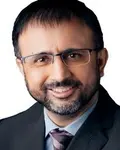
Specialty
Cardiology
Languages
English, Hindi, Punjabi
Gender
Male
Insurance Panel
HSBC Life, Singlife, AIA, Prudential^
Please check with your insurance provider for more information, and for their most up-to-date list of panel doctors.
^Specialists may qualify to be on the Extended Panel (EP). You may enjoy selected panel benefits depending on your policy and riders.
Contact our call centre
Experience
Dr Devinder Singh is an cardiologist and electrophysiologist at Mount Elizabeth Hospital, Singapore.
He has experience in a wide range of cardiovascular conditions and his expertise lies in performing cardiac electrophysiology study and catheter ablation to diagnosis and manage complex heart rhythm disorders (arrhythmias).
Prior to private practice, Dr Singh has been in public service for more than two decades. He was a senior consultant in the department of cardiology at the National University Heart Centre, Singapore (NUHCS) and a visiting consultant at Ng Teng Fong General Hospital, Singapore. He was also the director of cardiac informatics at the National University Hospital (NUH). He holds the position of assistant professor at the Department of Medicine of Yong Loo Lin's School of Medicine, National University of Singapore (NUS).
Dr Singh graduated with bachelor degrees from Gauhati University, Assam, India. He obtained his Master’s in internal medicine at Maharshi Dayanand University, Haryana, India, and was admitted as a member of the Royal College of Physicians, UK. Thereafter, he completed his advanced specialist training in cardiology, sub-specialising in cardiac electrophysiology at NUHCS.
He was awarded the Academic Medicine Development Award and completed a one-and-half-year advanced fellowship training in cardiac electrophysiology at Duke University Medical Center, North Carolina, USA, under the Accreditation Council for Graduate Medical Education programme. He also completed his fellowship in cardiac magnetic resonance imaging at Duke University.
While at NUHCS, Dr Singh performed cardiac electrophysiology procedures (catheter ablation of arrhythmias) and the implantation of cardiac implantable electronic devices (CIEDs) such as pacemakers, implantable cardioverter-defibrillators and cardiac resynchronisation therapy. He was among a core group of cardiologists who looked after critically-ill patients in the intensive care or coronary care unit. He was also part of a select group of cardiologists who performed invasive pericardiocentesis (drainage of pericardial effusion) for patients.
He has performed more than 800 catheter ablation procedures and more than 1,000 CIEDs. He also has done more than 500 cardiac magnetic resonance imaging studies. Dr Singh has been practising medicine for more than 20 years.
At NUH, he was drove key technological innovation in the department of cardiology. He led the electronic electrocardiography (ECG) project at NUH, replacing the manual process of ordering and reporting ECGs. This project won the Excellence Award at the Hospital Management Asia Award in 2014.
Dr Singh was also the lead in Value-Driven Outcome projection for patients with myocardial infarction, which led to the improvement in the care of patients who suffer from heart attacks.
He serves as an assistant professor in NUS' Yong Loo Lin's School of Medicine and was core faculty in the training of cardiology residents under the Accreditation Council for Graduate Medical Education. Additionally he is an examiner in the final year MBBS examination for graduate medical students held by NUS.
Awards and honours
- 2014
Hospital Management Asia Award (Excellence)
Fellowship and accreditation
1998
MBBS (Gauhati U, India)2006
MRCP (UK) (RCP, United Kingdom)
Contact Our Call Centre
Clinic
Cadence Heart Centre
3 Mount Elizabeth #14-13
Mount Elizabeth Medical Centre
SG 228510
Mount Elizabeth Medical Centre
SG 228510
6369 2789
 Brain & Spine Care
Brain & Spine Care


